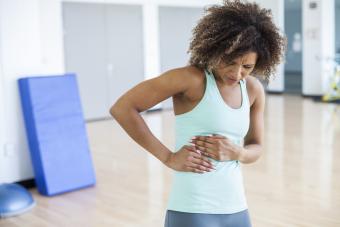
If you've finished an especially intense workout, you may ask yourself, "Why do my legs ache after exercising?" Your question is a valid one which can point to several causes. It is one of the paradoxes about physical fitness that sometimes exercising can cause pain despite the fact that it is essential for good health.
Why Do My Legs Ache After Exercising?
When legs ache after exercising it can dissuade you from wanting to exercise more, but knowing that the ache is fairly common and will lessen as you continue with your workouts can help you push forward in your fitness goals.
Lack of Activity
Achy leg muscles can be a result of inactivity. Perhaps you have not been exercising frequently. Suddenly, your body is faced with a rush of new activity when you decide to take up jogging or biking. Unconditioned muscles are likely to ache after a surge of new activity. The irony of your aches and pains is that you must exercise in order to prevent future issues. However, with some people, the initial pain can be a barrier to continued exercise.
Cold Muscles
On the other hand, if you do exercise, it is important that you stretch before and after your workouts. Your hip muscles may become tight if you hike or bike, causing that uncomfortable ache in your legs. Stretching helps increase your flexibility and range of motion which can help prevent the pain caused by exercise. Stretching after exercise takes advantage of your warmed muscles and the increased blood flow to achieve the maximum benefits.
Lactic Acid Production
If you exercise regularly, you build up your lung capacity and improve your body's ability to deliver oxygen to your body's tissues. The glucose in your blood will fuel your activity. If you cannot keep up with your energy demands, your body will resort to breaking down carbohydrates for energy using a method which does not require oxygen, producing lactic acid in the process.
The Body's Safeguard
The byproduct of this lactic acid production is pain in your legs, often as a burning sensation. In a way, this action is one safeguard your body uses to encourage you to reduce the intensity of your activity. Contrary to popular belief, lactic acid production causes pain during and immediately after exercise. It is not likely the sole the cause for the achiness you feel later, but rather a possible contributing factor among many, says a study published in Scientific American.
Muscle Strain
Sometimes muscle strain may occur a day or two after you have worked out. Delayed onset muscle soreness (DOMS) is common when you begin a new exercise program. When your muscles ache after exercise, the pain represents your body making the adjustment to your new activity.
The exact cause, and thus cure, of DOMS is not known. Researchers believe that this pain may be caused by tiny tears in your muscle fibers which occur when you exercise, especially after an intense effort. While you may associate it as a beginner's problem, even seasoned athletes can experience DOMS.
Preventing Muscle Strain
Some precautions can be taken to help you avoid muscle strains from exercise, says The Southern California Orthopedic Institute:
- Regular strength training will make your body less susceptible to muscle strains.
- Warming up before and cooling down after exercise helps your muscles in recovery.
Shin Splints
Another possible cause of post-exercise pain can be shin splints. With shin splints, your pain is typically confined to the tibialis anterior muscle on the front of your lower leg. Like other causes, shin splints occur from overuse of your muscles.

Whereas with muscle strains, you use low intensity activity to work through the pain, with shin splints you should rest and refrain from exercise until your pain abates. Alternating ice and heat therapies may provide some relief. Rest, in most cases, is the best cure.
Electrolyte Imbalance
An electrolyte imbalance can lead to leg pain, and since vigorous exercise without proper supplementation can lead to this type of imbalance, it may seem as though the exercise itself caused the leg ache. If your workouts are intense and lasting longer than an hour a day, a sports drink may be beneficial.
Medical Condition
In rare cases, there are potential medical causes for aching legs after exercise. Peripheral Artery Disease, blood clots, and arthritis can all cause the legs to ache, and if you only notice the ache after exercise, you might assume there is a correlation. Speak to your physician if you worry there may be something more to your aching legs beyond delayed onset muscle soreness.
Learn From Experience
Leg pain after exercise can be very frustrating, especially if you are just beginning a new workout program. Recognizing the possible causes can help you avoid the aches which may keep you from exercising. Learn from your experiences so that you can stay active.







